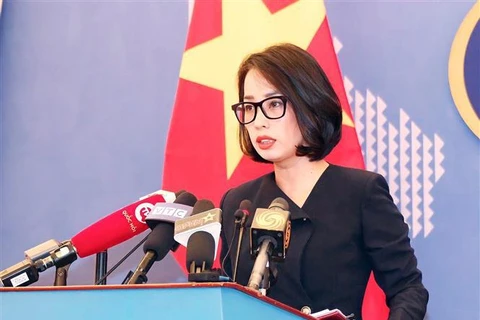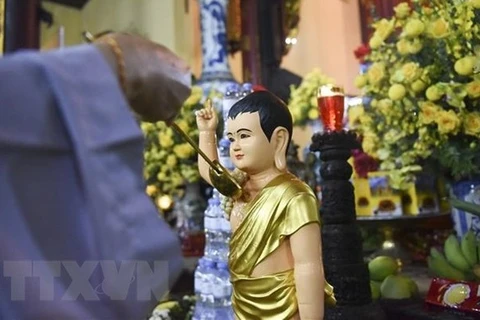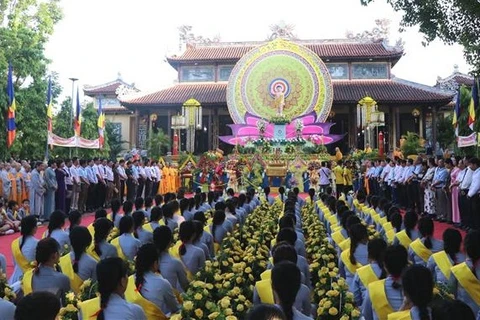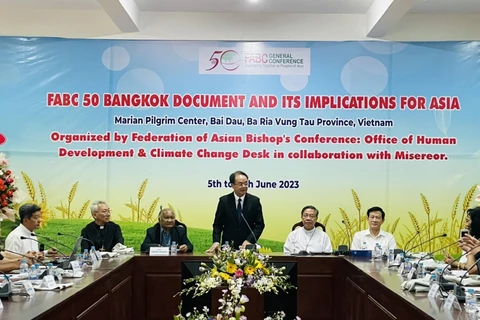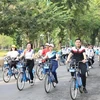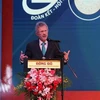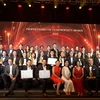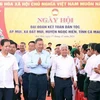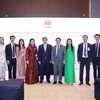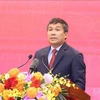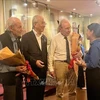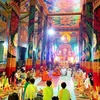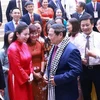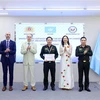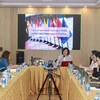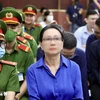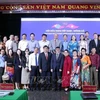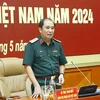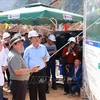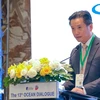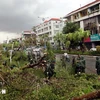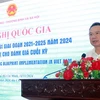 Peace prayer at the annual Kate festival of the Cham ethnic minority people at Po Sah Inu Cham Tower relic site in Binh Thuan province (Photo: VNA)
Peace prayer at the annual Kate festival of the Cham ethnic minority people at Po Sah Inu Cham Tower relic site in Binh Thuan province (Photo: VNA) Hanoi (VNA) - The Party and State of Vietnam always affirm that belief and religion are the spiritual needs of the people, which have been and will be coexisting with the nation, and followers of all religions are part of the great national unity bloc.
On April 4, the Cham Brahman people in the south central province of Binh Thuan celebrated one year since the Kate festival was included in the list of National Intangible Cultural Heritages under Decision No. 776/ QD-BVHTTDL, dated April 4, 2022, of the Ministry of Culture, Sports and Tourism.
In the Mekong Delta province of An Giang, the Ramadan month - the month of fasting for Muslims – took place from April 2 to May 2, with a full range of rituals such as: I'Sha prayer, Quran recitation, peace prayer and many charitable activities, sports, and art performances, in the respect of the community, and favourable conditions created by local authorities at all levels.
Also in April, the Khmer ethnic minority group in the Mekong Delta province of Hau Giang welcomed the Chol Chnam Thmay festival – their traditional New Year – in a merry and festive atmosphere.
In early June, on the occasion of Vesak Day - the 2567th birth anniversary of the Buddha, Buddhist institutions in all provinces and cities in Vietnam were decorated solemnly to welcome monks, nuns, Buddhists, as well as people to the celebrations.
In his message on the Vesak Day, Most Venerable Thich Tri Quang, Supreme Patriarch of the Patronage Council of the Vietnam Buddhist Sangha (VBS) called for all Buddhist monks, nuns and followers to pray for an end to wars, conflicts, and epidemics, for favourable weather, and for a strong and prosperous Vietnam.
 Vesak Day, the 2567th birth anniversary of the Buddha, marked at Ho Chi Minh City’s Viet Nam Quoc Tu (Vietnam National Buddhist Pagoda) on June 1 – the 15th day of the fourth lunar month. (Photo: VNA)
Vesak Day, the 2567th birth anniversary of the Buddha, marked at Ho Chi Minh City’s Viet Nam Quoc Tu (Vietnam National Buddhist Pagoda) on June 1 – the 15th day of the fourth lunar month. (Photo: VNA) It can be said that diverse and rich religious activities take place daily in the territory of Vietnam. The common feature of these activities is that they are suitable to the traditional culture of the Vietnamese people, meet the needs of the community’s spiritual life, and are protected by law.
Religions coexist with the nation
Vietnam is a multi-religious country with various religions coexisting with the nation and equal before the law.
The Communist Party of Vietnam, since taking over the leadership of the revolution in Vietnam, has pursued a consistent policy on ensuring the freedom of beliefs and religions, strengthening the great national solidarity bloc and uniting followers of all religions as well as non-religious people in the process of national construction and defence.
Only one day after the declaration on the establishment of the Democratic Republic of Vietnam (now the Socialist Republic of Vietnam), at the first meeting of the Government on September 3, 1945, President Ho Chi Minh pointed out the principled viewpoint on Vietnam’s religious policy – “I’d like to request that the Government declare freedom of belief and solidarity of secular and religious people.”
Institutionalising that viewpoint, on June 14, 1955, the President signed Decree No 234/SL, comprising five chapters with 16 articles, which was the first legal document to stipulate the Governmen’s responsibility for guaranteeing the people’s right to religous freedom, along with religious dignitaries and followers’ responsibilities and obligations related to religious activities in Vietnam.
President Ho Chi Minh’s viewpoint has been reflected in the Constitution by the Party and State, from the first version in 1946 to the latest one that was issued in 2013.
The 2013 Constitution and legal documents related to beliefs and religions have been perfected in the direction of approaching international law and the 1966 International Covenant on Civil and Political Rights (ICCPR) to which Vietnam is a member, in order to ensure that everyone better enjoys the right to freedom of belief and religion.
Notably, the 2013 Constitution regulates that “All people have the right to freedom of belief and religion, and have the right to follow or not follow any religions. All religions are equal before the law”.
With the ultimate goal of bringing into play the people’s right to mastery and meet the legitimate belief and religious demand of all people, the 14th-tenure National Assembly promulgated the Law on Belief and Religion while the Government released Decree No. 162/2017/ND-CP detailing some articles and measures for enforcing this law.
The Government’s efforts in perfecting guidelines, policies and laws on religion have really had a positive impact on the community's religious and belief life, leading to an increase in the numbers of religious dignitaries and followers, and worship establishments.
Statistics from the Government Committee for Religious Affairs showed that in 2003, there were six religions with 15 organisations, 17 million followers, about 20,000 places of worship, 34,000 “chuc sac” (dignitaries), and 78,000 “chuc viec” (sub-dignitaries) in the country. As of 2022, Vietnam had recognised 43 organisations of 16 religions, with about 27.2 million followers, over 53,000 dignitaries, 148,000 sub-dignitaries, and 29,718 places of worship.
More than 8,000 festivals linked with beliefs and religions are held each year, attracting the participation of tens of thousands of followers.
In addition, there are over than 8,000 religious and belief festivals each year. Religious organisations have more 500 medical facilities, over 800 social protection establishments, and 300 preschools.
National unity, religious solidarity - driving force for development
It can be said that religions have never had such favourable conditions to operate as today. Religious activities of foreigners in Vietnam are made public in accordance with the law, while domestic religious organisations are facilitated to promote exchanges with others around the world.
Since 2011, about 2,000 individuals of different religions have gone abroad to attend training courses, and international conferences and seminars related to religions. At the same time, nearly 500 foreign delegations, with more than 3,000 people, have come to Vietnam for exchanges at worship establishments, to attend religion-related events organised by Vietnamese religious organisations such the United Nations Day of Vesak hosted by the Vietnam Buddhist Sangha three times, with over 1,000 international delegates from 120 countries and territories, the Evangelical Church of Vietnam’s ceremony marking the 500th anniversary of the Protestant Reformation, an assembly of the Federation of Asian Bishops’ Conferences.
In addition, the right to freedom of belief and religion for foreigners legally residing in Vietnam is also respected and guaranteed by the State. This meets the country's socio-economic development, the trend of globalisation and international integration, and an increase in the number of foreigners working in the country.
Currently, the country has 67 places of religious activities for foreigners, mainly in Ho Chi Minh City (41 places) and Hanoi city (13) with the participation of hundreds of people from many countries such as the Republic of Korea, the Philippines, Singapore, Malaysia, Russia, the US and France.
The Vietnamese Party and State have always affirmed that the main driving force for the country's development is national unity and religious solidarity. The Party and State advocate the eradication of complex and prejudice, and non-discrimination in terms of class, ethnicity and religion; and respect different opinions which are not contrary to national interests; and uphold the tradition of humanity and tolerance, for the stability and development of the country.
Whenever the Party has new guidelines and views on religion, the State promptly institutionalises them with legal documents to put them into practice.
There are five religious dignitaries elected to the 15th National Assemly, including four re-elected; 88 dignitaries and sub-dignitaries and 35 followers are elected as deputies to the provincial People's Councils; and 225 dignitaries and sub-dignitaries and 246 followers elected to the district People’s Councils for the 2021-2026 tenure.
During 10 years of implementing the policies and laws on belief and religion, competent state agencies have granted hundreds of hectares of land for building places of worship. In 2022 alone, all-level authorities licensed the building, repair, and upgrade of 486 places of religious worship. Meanwhile, 183 places and groups were licensed to carry out concentrated religious activities, and more than 3,850 persons elected or appointed to act as dignitaries and sub-dignitaries.
Rejecting distortions about the policy on freedom of belief and religion in Vietnam
However, hostile forces have never given up the plot of "peaceful evolution", taken advantage of freedom of belief and religion, and collude with some extremists to distort and slander Vietnam for violating freedom of religion, and demand the release of people who “fight for freedom of religion”
Some hostile individuals misrepresented the “registration of places of concentrated religious activities” in the Law on Belief and Religion as to “suppress religious activities”. Several hostile forces took advantage of social issues related to environmental pollution, personnel work, and the fight against corruption of the Vietnamese Party and State to distort views, guidelines, policies and laws of the country, with the aim of causing confusion among people, sowing slanders among religious dignitaries and followers, thus causing doubts and reducing the faith of religious dignitarities and followers in the Party and State.
From several noticeable cases related to religion, hostile and reactionary forces have integrated political factors to incite people not to cooperate with the government and participate in protests; and slandered the Vietnamese State to suppress religion, prohibit the construction and repair of worship establishments, and obstruct belief and religious activities of dignitaries, sub-dignitaries, and monks.
A number of groups and individuals of Vietnamese exiles abroad, through their websites, regularly publish news and articles accusing Vietnam of violating human rights and suppressing freedom of religion; inciting people, first of all religious followers, to fight for “freedom of religion”, and “human rights”; and write open letters calling on political organisations and individuals at home and abroad to intervene.
The above allegations are contrary to the reality that has been happening in Vietnam. In the past years, with the Vietnamese State’s encouragement and creation of conditions for religious organisations to promote their resources to participate in social welfare activities, religious organisations have spent thousands of billions of Vietnamese dong on activities of educational institutions, medical facilities and social protection establishments as well as charity and humanitarian activities; and at the same time actively participated in the prevention and control of natural disasters and epidemics.
During the years of the COVID-19 pandemic, religious organisations have joined hands with local authorities and people, regardless of religion, in the fight against the pandemic as well as in the post-pandemic economic recovery and development.
The joint efforts and consensus of the entire people and administrations at all levels have brought about positive results in the country’s economic recovery and development - which has been appreciated and recognised by the international community as one of the region's bright spots for economic recovery, and a successful model in pandemic prevention.
At the 14th Annual Meeting of the New Champions of the World Economic Forum (WEF) recently held in Tianjin, China, Vietnamese Prime Minister Pham Minh Chinh was invited to speak at the Country Strategic Dialogue on Vietnam themed “Promoting new growth drivers to create the future of the country”, with the participation of WEF Founder and Executive Chairman Klaus Schwab and WEF President Børge Brende and about 50 leaders of global corporations that are WEF members.
This was the only Country Dialogue organised by the WEF within the framework its 2023 Annual Meeting, aiming to introduce Vietnam's experience as a model for economic recovery and efforts in transitioning its growth model. It provided an opportunity to exchange views on the Southeast Asian nation’s business-investment directions, policies, and environment.
On March 9, 2023, the Ministry of Information and Telecommunications and the Government Committee for Religious Affairs released the White book on religions and religious policies in Vietnam.
A 132-page book consists of three chapters that provides basic information about religions in Vietnam, its religious policies as well as achievements, challenges and advantages in ensuring the right to freedom of belief and religion.
It is an authentic basis to help refute misrepresentations about the situation of belief and religion in Vietnam; provide sufficient, transparent, and accurate information for people to soberly identify and resolutely fight against distortions and allegations with bad intentions which aim to separate the great national unity bloc, and plots to cause social unrest of hostile forces.
At a regular press briefing of the Ministry of Foreign Affairs on May 18, Deputy Spokeswoman Pham Thu Hang affirmed that as a multi-ethnic and multi-religious country with diverse religious and belief life, the Vietnamese State consistently implements a policy of respecting and guaranteeing a citizen's right to freedom of religion and belief, and the right to follow or not follow any religion; ensuring equality and non-discrimination on the grounds of religion or belief; and protecting activities of religious organisations by law.
Hang made the remarks in reply to reporters’ queries about Vietnam’s reaction to the US Department of State’s annual Report on International Religious Freedom released on May 15, 2023 and the US Commission on International Religious Freedom (USCIRF)’s annual report on international religious freedom in 2023.
"These rights are prescribed in the Constitution of Vietnam, the Law on Belief and Religion 2016 and related legal documents; and are guaranteed to be respected in practice," the deputy spokeswoman stressed.
Although the reports of the USCIRF and the US Department of State have noted some progress of Vietnam in promoting religious freedom and cited official information of the Vietnamese Government’s agencies, they have still presented subjective observations based on unverified and inaccurate information about the actual situation in Vietnam, she said.
“As we have affirmed many times, Vietnam is always ready to discuss with the US side on issues of mutual concern in the spirit of frankness, openness and mutual respect on issues in which the two sides still have differences, thus contributing to promoting the Vietnam – US comprehensive partnership”, Hang stated./.


